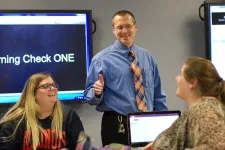(Press-News.org) For the first time in the World Health Organization’s 76 year history, world leaders have unanimously committed to put social participation - people, communities and civil society - at the heart of health decision making processes.
This landmark pledge marks an important step forward in creating a healthy world, say experts in The BMJ today, and they urge everyone to seize their right to influence the decisions that affect their health and well-being.
Global challenges such as access to care, climate change, widening social inequalities, demographic changes, and staff shortages are overwhelming our health systems, they explain. Yet if the public are empowered to fully partner in health, the resources, intelligence, and capacities of our health systems will exponentially increase.
The WHO resolution marks an important step forward, in three ways.
Firstly, it outlines clear government responsibilities to ensure that social participation is adequately funded and designed in a way that influences health related policies and system change.
Secondly, the resolution makes social participation a core function within health systems, rather than a set of ad hoc initiatives. This global perspective is important to reshape health systems, nurture trustful and long term relationships with communities, and build alliances across health sectors.
Thirdly, it offers powerful mechanisms to influence governments. Because they endorsed the resolution, governments have a political imperative to act and must show progress every two years to 2030.
Personal experience and knowledge, especially that of people who struggle the most to access health, is pivotal in helping us design better and more inclusive health systems, they write. To ensure the resolution has traction, we need strong, visible, and shared leadership from civil society and governments, they add.
Finally, they say health issues transcend national borders, and all countries must participate to achieve a healthy world.
“We need to share success stories, challenges, and solutions; learn from people across the globe; gain understanding from our diversities; build coalitions; and nurture the next generation of leaders to have the passion and expertise to ensure that no one is left behind.”
They conclude: “The social participation movement is global, but the power to act is rooted locally in the alliances we forge with each other.”
[Ends]
END
World leaders unite to embed social participation in health systems
Landmark WHO resolution marks an important step towards a healthy world
2024-07-11
ELSE PRESS RELEASES FROM THIS DATE:
AI Chatbots have shown they have an ‘empathy gap’ that children are likely to miss
2024-07-11
Artificial intelligence (AI) chatbots have frequently shown signs of an “empathy gap” that puts young users at risk of distress or harm, raising the urgent need for “child-safe AI”, according to a study.
The research, by a University of Cambridge academic, Dr Nomisha Kurian, urges developers and policy actors to prioritise approaches to AI design that take greater account of children’s needs. It provides evidence that children are particularly susceptible to treating chatbots as lifelike, quasi-human confidantes, ...
Dante on the Move: Refugee’s share experiences through the lens of 14th century poet
2024-07-11
International refugees and academic experts have contributed to a new book examining the resonance of Dante’s Divine Comedy with today’s migrants fleeing the troubles in their home countries.
Dante on the Move is launched in Rome today (Thursday 11th July) and has been produced as part of a research project Reading Dante with Refugees led by the University of Birmingham and Trinity College Rome. It features work by people from Afghanistan, China, Egypt, Iran, Iraq, Kurdistan, Ukraine, the USA and Venezuela.
Mohammed, a Kurdish refugee from Iraqi and contributor to the book survived a shipwreck in the Mediterranean in which many people drowned. He said: “Reading ...
Loneliness increases risk of age-related memory loss
2024-07-10
About a third of Canadians feel lonely, and a study from the University of Waterloo shows it has a greater negative impact on memory than even social isolation, though both present a significant risk to the aging population.
Loneliness is a subjective emotion that people might feel even while engaging in social activities. It is often associated with depression and an increase in stress hormones that may contribute to impaired memory.
Waterloo researchers examined four combinations of social isolation ...
Study: Nanoparticle vaccines enhance cross-protection against influenza viruses
2024-07-10
ATLANTA — To offer cross-protection against diverse influenza virus variants, nanoparticle vaccines can produce pivotal cellular and mucosal immune responses that enhance vaccine efficacy and broaden protection, according to a study by researchers in the Institute for Biomedical Sciences at Georgia State University.
The study, published in the journal Nature Communications, offers valuable insights into tailoring immunization strategies to optimize influenza vaccine effectiveness. To alleviate the significant ...
Student leadership development requires holistic approach, educators say
2024-07-10
URBANA, Ill. – Colleges and universities often highlight leadership development as a critical component of their curriculum — but there is no clear consensus on what constitutes effective leadership education. In a new paper, two educators from the University of Illinois Urbana-Champaign and John Carroll University provide a roadmap for training competent leaders, suggesting a comprehensive, practical approach for postsecondary institutions to follow.
“Our purpose was to discuss what it means to develop leaders and what a model for leadership education could ...
Mars likely had cold and icy past, new study finds
2024-07-10
The question of whether Mars ever supported life has captivated the imagination of scientists and the public for decades. Central to the discovery is gaining insight into the past climate of Earth’s neighbor: was the planet warm and wet, with seas and rivers much like those found on our own planet? Or was it frigid and icy, and therefore potentially less prone to supporting life as we know it? A new study finds evidence to support the latter by identifying similarities between soils found on Mars and those of Canada’s Newfoundland, a cold subarctic climate.
The study, published July 7th in Communications Earth and Environment, looked for soils on Earth with ...
Taylor Swift’s impact on fans’ body image attitudes mostly positive, research shows
2024-07-10
Taylor Swift’s past struggles with body image, disordered eating, and body objectification have had an overall positive influence on her fans’ attitudes on these issues, a new study from University of Vermont (UVM) researchers finds.
The new research, published in journal Social Science & Medicine, analyzed the top 200 TikTok and Reddit posts—including over 8,300 online comments—about Taylor Swift, eating disorders, and body image to determine the impact of Swift’s disclosures about her past eating disorder on her fans.
“Our findings suggest that fans who felt highly connected to Swift were influenced to positively change their behaviors ...
Prime editing efficiently corrects cystic fibrosis mutation in human lung cells
2024-07-10
Cystic fibrosis is one of the most common genetic disorders, causing thick mucus build-up in the lungs and other parts of the body, breathing problems, and infection. A three-drug cocktail known as Trikafta has greatly improved patient quality of life since its development in 2019, but can cause cataracts and liver damage and must be taken daily at a cost of about $300,000 per year.
Now, researchers at the Broad Institute of MIT and Harvard and the University of Iowa have developed a gene-editing approach that efficiently corrects the most common mutation that causes cystic fibrosis, found in 85 percent of patients. With further development, it could ...
PFA ependymoma brain tumors display unique 3D genome features that could be exploited therapeutically
2024-07-10
Researchers have identified unique 3-dimensional features called TULIPs in the genome of posterior fossa group A (PFA) ependymoma, a difficult-to-treat brain tumor diagnosed in very young children. The findings, published in Cell by a team of researchers at Baylor College of Medicine, Texas Children’s Hospital, McGill University and collaborating institutions, could lead to the development of new treatments.
“PFA ependymomas are lethal. Radiation therapy, the only treatment currently available, is not curative and can cause serious developmental and cognitive issues,” ...
SLAC’s high-speed electron camera uncovers a new ‘light-twisting’ behavior in an ultrathin material
2024-07-10
While taking snapshots with the high-speed “electron camera” at the Department of Energy’s SLAC National Acceleratory Laboratory, researchers discovered new behavior in an ultrathin material that offers a promising approach to manipulating light that will be useful for devices that detect, control or emit light, collectively known as optoelectronic devices, and investigating how light is polarized within a material. Optoelectronic devices are used in many technologies that touch our daily lives, including ...
LAST 30 PRESS RELEASES:
Scientists show how to predict world’s deadly scorpion hotspots
ASU researchers to lead AAAS panel on water insecurity in the United States
ASU professor Anne Stone to present at AAAS Conference in Phoenix on ancient origins of modern disease
Proposals for exploring viruses and skin as the next experimental quantum frontiers share US$30,000 science award
ASU researchers showcase scalable tech solutions for older adults living alone with cognitive decline at AAAS 2026
Scientists identify smooth regional trends in fruit fly survival strategies
Antipathy toward snakes? Your parents likely talked you into that at an early age
Sylvester Cancer Tip Sheet for Feb. 2026
Online exposure to medical misinformation concentrated among older adults
Telehealth improves access to genetic services for adult survivors of childhood cancers
Outdated mortality benchmarks risk missing early signs of famine and delay recognizing mass starvation
Newly discovered bacterium converts carbon dioxide into chemicals using electricity
Flipping and reversing mini-proteins could improve disease treatment
Scientists reveal major hidden source of atmospheric nitrogen pollution in fragile lake basin
Biochar emerges as a powerful tool for soil carbon neutrality and climate mitigation
Tiny cell messengers show big promise for safer protein and gene delivery
AMS releases statement regarding the decision to rescind EPA’s 2009 Endangerment Finding
Parents’ alcohol and drug use influences their children’s consumption, research shows
Modular assembly of chiral nitrogen-bridged rings achieved by palladium-catalyzed diastereoselective and enantioselective cascade cyclization reactions
Promoting civic engagement
AMS Science Preview: Hurricane slowdown, school snow days
Deforestation in the Amazon raises the surface temperature by 3 °C during the dry season
Model more accurately maps the impact of frost on corn crops
How did humans develop sharp vision? Lab-grown retinas show likely answer
Sour grapes? Taste, experience of sour foods depends on individual consumer
At AAAS, professor Krystal Tsosie argues the future of science must be Indigenous-led
From the lab to the living room: Decoding Parkinson’s patients movements in the real world
Research advances in porous materials, as highlighted in the 2025 Nobel Prize in Chemistry
Sally C. Morton, executive vice president of ASU Knowledge Enterprise, presents a bold and practical framework for moving research from discovery to real-world impact
Biochemical parameters in patients with diabetic nephropathy versus individuals with diabetes alone, non-diabetic nephropathy, and healthy controls
[Press-News.org] World leaders unite to embed social participation in health systemsLandmark WHO resolution marks an important step towards a healthy world




